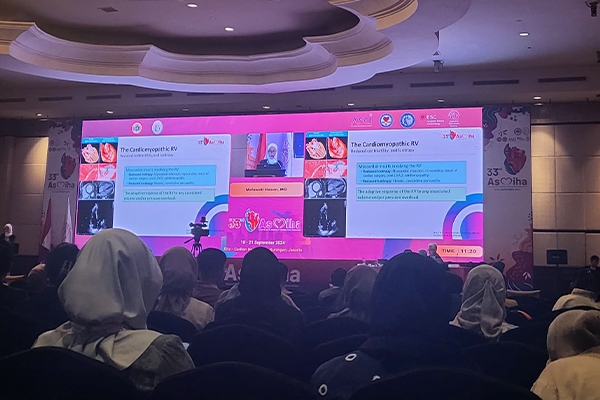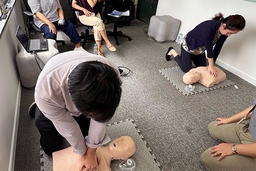ASMIHA 2024: Uncovering the Latest Cardiology Innovations and Multidisciplinary Collaborations

GWS Medika participated in ASMIHA 2024, exhibiting its commitment to supporting innovation and health development and continuing to improve heart health care in Indonesia.
The lack of awareness and implementation of a healthy lifestyle to support heart health continues to contribute to the rising prevalence of cardiovascular disease in Indonesia.
This issue is an essential concern for policymakers and healthcare workers. Therefore, promotive and preventive efforts against heart disease through health campaigns and public education must be carried out continuously to increase knowledge and change people's behavior in the long term.
To support these promotional and preventive initiatives, medical personnel must continue to update their knowledge and stay current on technological developments in cardiovascular science. One method is to attend scientific meetings both at the national and international levels.
The "Annual Scientific Meeting of the Indonesian Heart Association" (ASMIHA) 2024 was held again with a focus on the latest discussions on cardiovascular science. This event occurred on September 18-21, 2024, at the Ritz Carlton Mega Kuningan, Jakarta. More than 2,000 participants attended it, including cardiologist, general practitioners, medical students, and other health workers.
One of the participants was dr. Dayu Dwi Deria, a general practitioner at GWS Medika Clinic. She participated in the symposium and presented a scientific poster on “Palliative Care in Advanced Heart Failure.”
In recent years, palliative care has become an essential part of the treatment of patients with heart failure. This condition has also been followed by a paradigm shift in society regarding palliative care for patients with heart failure. Previously, palliative care was dominated by end-of-life care (EoC).
However, palliative care can currently be obtained from the first diagnosis to the end of treatment. The latest guidelines on palliative care have been shown to improve patient clinical outcomes, quality of life, and treatment adherence, as well as provide psychosocial support for patients and families while reducing hospitalization rates.
Cardiovascular science and technology developments
ASMIHA 33 showcased the most recent breakthroughs in cardiology, including technological innovations. One topic that attracted attention was using artificial intelligence (AI) to manage cardiac arrhythmias. Afibnet, PPG-based technology, and HeartM are examples of AI-powered technologies that have helped diagnose heart rhythm disorders. In addition, AI is being integrated into wearable devices that allow patients to be actively involved in managing their health.
ASMIHA 2024 also discussed developments in minimally invasive interventions, especially in aortic and mitral valve surgery. The European Society of Cardiology (ESC) has supported using robotic technology and thoracoscopic techniques because they can reduce postoperative pain and accelerate recovery. However, these techniques require special training and can increase the duration and cost of surgery.
Challenges of cardiovascular management in Indonesia
One of the biggest challenges in managing cardiovascular disease in Indonesia is the high prevalence of risk factors, such as hypertension, diabetes, and dyslipidemia. Sedentary lifestyles and poor diets increase the risk of obesity and metabolic syndrome. In addition, socio-economic and geographic disparities worsen this situation, especially in rural areas with limited access to health services. These conditions often hinder early diagnosis and timely treatment.
ASMIHA 2024 also emphasised the importance of multidisciplinary collaboration in managing cardiovascular disease. By involving specialists such as cardiologist, endocrinologists, nephrologists, nutritionists, and mental health specialists, patients can receive more comprehensive and targeted care. This collaborative model has improved patient adherence to treatment plans and reduced hospitalization rates.
ASMIHA 2024 is a platform for healthcare workers to learn about the newest breakthroughs in cardiology. One main issue is the low public awareness of cardiovascular disease risk factors. Public health campaigns aimed at raising awareness and promoting a healthy lifestyle are essential to reducing the prevalence of this disease in Indonesia.
The role of digital technology in the future of cardiology
The role of digital technology is also a primary focus of ASMIHA 2024. AI, telemedicine, 3D bioprinting, advanced imaging techniques such as multidetector computed tomography (MDCT), and research into circular RNAs (circRNAs) offer great potential in improving clinical outcomes and shortening patient stays.
This conference is expected to improve the quality of cardiovascular care in Indonesia through technological innovation and multidisciplinary collaboration, leading to better clinical outcomes for patients.
GWS Medika's participation in ASMIHA 2024
ASMIHA 2024 is a forum to deepen cardiology knowledge and an opportunity for various clinics and health institutions, including GWS Medika, to participate and promote the health innovations they provide.
GWS Medika Permata Hijau Clinic now provides comprehensive heart health services. These services are supported by facilities and experts in the cardiovascular field as part of GWS Medika's contribution to preventing and detecting heart disease. GWS Medika's participation in events such as ASMIHA 2024 further strengthens its commitment to supporting education and research in cardiology.



